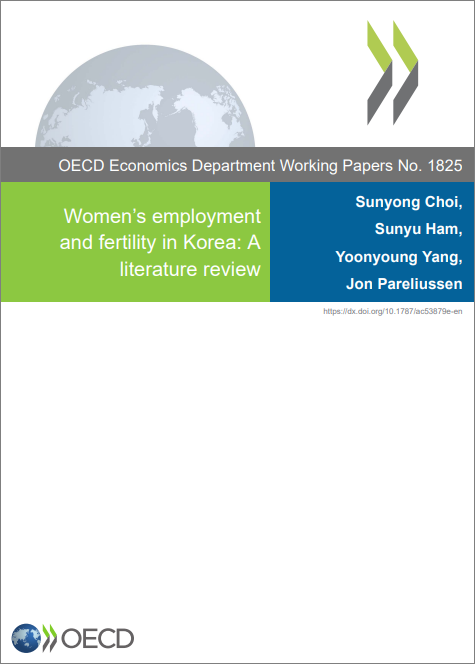
□ 한국의 출산율은 세계 최저 수준으로, 여성들이 직업과 육아 사이에서 선택을 강요받는 상황이 주요 요인으로 지적
- 가족 정책, 예컨대 보육 지원과 육아휴직이 확대되었으나, 이러한 정책이 여성의 고용과 출산율을 효과적으로 높이는 데는 한계. 이는 장시간 근로 문화와 일·가정 양립의 어려움 때문으로 분석
□ 본 보고서는 고용 안정성과 양질의 보육 서비스 접근성이 여성의 노동시장 참여와 출산 선택에 큰 영향을 미친다고 결론
- 결과적으로, 여성들이 직장과 육아를 합리적으로 병행할 수 있는 환경 조성이 필요하며, 그렇지 않을 경우 출산율은 지속적으로 낮은 수준을 유지하거나 더 감소할 수 있다고 강조
목차
Title page
Contents
Abstract/Résumé 4
1. Introduction 6
2. Fertility trends and decompositions 7
3. The work-family conflict 13
4. Family policies and their effects on fertility and female employment 22
5. Summary and conclusions 30
References 33
Table 1. Age-specific fertility rates, 1955-2000 8
Table 2. Decomposition of changes to the total fertility rate by changes in marriage rate and marital fertility rate using synthetic cohorts, 2000-2016 9
Table 3. Changes in parity progression ratios by period: 1965-2014 11
Table 4. Household income, childcare allowance and use of childcare facilities (2018) 23
Table 5. Childcare allowance and use of childcare facilities by child age (2018) 24
Table 6. Use of maternity and parental leave and employment retention rates after returning to work (2002-2013) 27
Figure 1. Trends in the number of births and total fertility rate, 1970-2022 8
Figure 2. Age-specific fertility rates, 2002, 2012, 2022 10
Figure 3. Cohort total fertility rate and average age of childbearing: 1946 to 1977 cohorts 11
Figure 4. Proportions of childless married women by age group (2015, 2020) 12
Figure 5. Childlessness rate among married women by birth cohort, 2015 12
Figure 6. Marriage rate by age group in 2000 and 2020 13
Figure 7. Employment rates by gender 14
Figure 8. Percentage of unmarried people from the 1969 and 1979 cohorts 19
Figure 9. Share of dual-income households among married couples 20
Figure 10. Percentage of dual-income households among married couples 21
Figure 11. Use of flexible work arrangements 22
Figure 12. Parental leave uptake rate among parents of newborns 26


